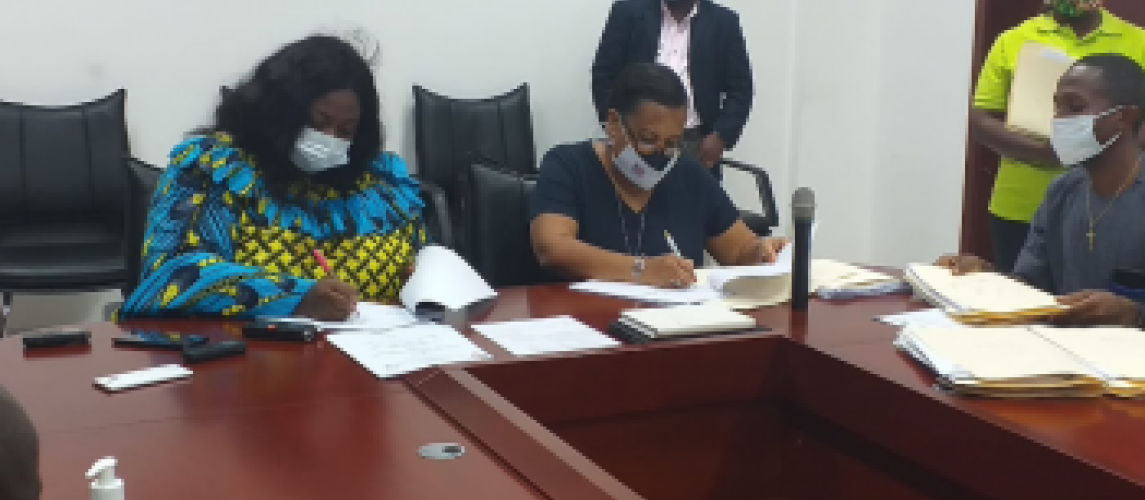
Liberia: Ministry of Agriculture Empowers Local Agri-Entrepreneurs to Boost Rice and Cassava Production
Monrovia – In a bid to mitigate the impact of COVID-19 on the agriculture sector, the Ministry of Agriculture (MOA) with funding from the World Bank has awarded contracts to 10 smallholder farmers and food processors for rice and cassava production.
The contracts are being implemented under the MOA Smallholder Agriculture Transformation Agribusinesses Revitalization Project (STAR-P).
At the signing ceremony on Friday, the Minister of Agriculture, Madam Jeanine Milly Cooper said the STAR-P, through its COVID-19 emergency proposal attracted US$10.5 million from the World Bank under the contingency emergency response component to mitigate the impact of the pandemic on agriculture and food security for Liberians.
Of the amount, she noted that US$5 million was given to the World Food Program (WFP) for food distribution, while the remaining fund was given to the MOA for the empowerment of Liberian-owned agribusinesses to boost locally grown food production including rice and cassava for onward distribution to vulnerable citizens and institutions.
Entities that benefitted include the Bravo Sisters (contracted to produce 18 metric tons of fufu flour, 17 metric tons of cassava flour (de-pot) and 70 metric tons of gari); FALAMA Inc.(70 metric tons of cassava flour, 27 metric tons of fufu flour and 100 metric tons of gari); Global Agro (50 metric tons of gari, 50 metric tons of fufu flour and 50 metric tons of cassava flour) and Destiny Women (105 metric tons of cassava flour, 29 metric tons of fufu flour and 70 metric tons of gari).
Other entities that signed on Friday include the Liberian Business Incubator (70 metric tons of gari, 105 metric tons of fufu flour and 34 metric tons of cassava flour); Logan and Logan INC (70 metric tons of fufu flour, 60 metric tons of gari and 27 metric tons of cassava flour and 125 metric tons of locally grown rice), Selma Development Agriculture Corporation (175 metric tons of locally grown rice); Agriculture Infrastructures Investment Company (250 metric tons of locally grown rice) and FABRAR Incorporated (200 metric tons of locally grown rice).
Minister Cooper, who before her appointment founded and managed FABRAR Liberia, the largest rice processor and producer in Liberia has vowed to empower Liberian-owned agri-businesses and farmers.
But barely two months into her appointment, Liberia was hit by the COVID-19 pandemic which continues to adversely impact every sector of the economy.
However, Minister Cooper and her team continue to identify potential and qualified agribusinesses to access contracts that could boost their capacities to produce various food products to supply the GOL for distribution to vulnerable citizens.
“We noticed that there would be a severe impact on our agriculture sector and food security if certain measures were not taken. We then developed a proposal to seek funding from donors to support agriculture,” she said.
“This has been a long journey since we started but the interactions and procurement processes have been very tedious to allow us come thus far.”
Speaking further, She noted the program was also part of President George Weah’s commitment to empowering local businesses, adding, “Since my ascendency to this position, the President has always told me to make sure that agribusinesses are empowered.”
Also speaking at the signing ceremony, the beneficiaries through their representative, Joseph S. Harris, thanked Minister Cooper and her team for the exemplary leadership exhibited within a short period of her appointment and pledged to live up to their commitments.
Harris said the impact of the program will have a trigger-down effect as many farmers and families will benefit. He also called on the government to invest more into the agriculture so that the country can become food secure.
